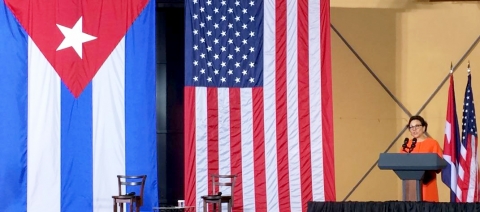Mar252016
Posted at 12:17 PM
In December 2014, President Obama called for the re-establishment of diplomatic relations between the U.S. and Cuba. Since this historic announcement, the Obama Administration’s policy toward Cuba has been rooted in the belief that the U.S. can do more to support the Cuban people and promote American values through engagement than through isolation.
Since December 2014, the Departments of Commerce and the Treasury have made several significant regulatory updates since the U.S. began to move toward normalizing relations with Cuba including: easing limits on exports to and certain imports from the Cuban private sector, eliminating certain restrictions on remittances, facilitating trade in the telecommunication and agriculture sectors, making changes to facilitate authorized travel to the island, and authorizing certain U.S. companies to establish and maintain a business and/or physical presence in Cuba.
In October 2015, Secretary Pritzker traveled to Havana to help lay the foundation for new relationships and trust between the United States and Cuba after 50 years of broken commercial and diplomatic ties. Secretary Pritzker and Cuban Minister of Foreign Trade and Foreign Investment Rodrigo Malmierca launched the U.S.-Cuba Regulatory Dialogue, a brand-new mechanism for officials from both countries to discuss the impact of U.S. policies toward Cuba, and for U.S. officials to learn more about the structure and status of the Cuban economy.
During this week's trip, President Obama and Secretary Pritzker worked to build on the progress the Administration has made toward normalization of relations with Cuba. In addition to meeting with government officials, President Obama and Secretary Pritzker engaged with Cuban entrepreneurs to highlight the work they are doing to energize Cuba’s economy and reinforce the Administration’s commitment to supporting entrepreneurship in Cuba.
With the Administration’s regulatory changes, the American business community is now permitted to work directly with the Cuban private sector in certain areas, thus empowering Cuban entrepreneurs on the island. In addition, more U.S. companies are now operating on the island, within the confines of the embargo. In April 2015, Airbnb set up service for authorized U.S. travelers to stay in the homes of private Cuban hostel owners, and within a year, Airbnb listings in Cuba have grown from 1,000 to well over 4,000. In February 2016, Cleber LLC announced its plans to set up a tractor manufacturing facility in Cuba, which would directly employ Cuban workers and produce much needed tractor equipment for agricultural production.
Despite the Administration’s efforts, U.S. companies eager to do business in Cuba continue to face challenges. For the new regulations to achieve maximum impact, the Cuban government needs to take action that addresses these challenges. These challenges include: the requirement that foreign businesses hire Cubans through state organizations; difficulty identifying and reaching the responsible officials in the Cuban government to discuss business opportunities; and the lack of regulatory transparency in Cuba.
While Cuban society will not be transformed overnight, both President Obama and Secretary Pritzker hope that ongoing discussion will pave the way for progress that creates prosperity for the people of both countries.

